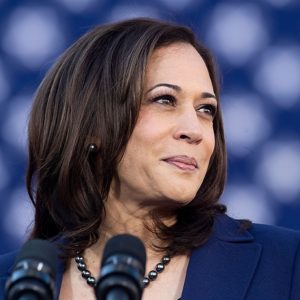Editor’s Note: For another viewpoint, see Point: As Crises Mount, Kamala Harris Is Out of Sight.
There is little doubt that Kamala Harris’ star is fading.
There’s also little doubt that her decline has almost nothing to do with her and everything to do with the position she holds.
On paper, as the cliché goes, the U.S. vice presidency is “the second most powerful position in America.” In reality, as is true with most clichés, historians, politicians, and Washington insiders have always understood that claim to be a bunch of bunk.
The kind of criticism Harris is facing for her political evanescence is as old as our nation itself. With a few exceptions — led by Dick Cheney and Richard Nixon — vice presidents historically have been so powerless, many have joined their detractors in a form of self-mockery, both sad and hilarious.
John Adams, the first vice president as No. 2 to George Washington, said: “My country has in its wisdom contrived for me the most insignificant office that ever the invention of man contrived or his imagination conceived.”
As VP to the charismatic John F. Kennedy, LBJ regularly mocked his role, often in profanely colorful terms, and complained that he’d held much more real power as Senate majority leader.
Johnson succeeded JFK in November 1963 on one of the darkest days in American history, and the position of vice president was left vacant. In the 1964 presidential campaign Johnson chose Hubert Humphrey as his running mate. It didn’t take long for the former Minnesota senator to learn that the post was largely honorary, especially under a personality as strong as LBJ’s Texas temperament.
“There is the old story about the mother who had two sons,” Humphrey said. “One went to sea, and the other became vice president, and neither was ever heard from again.”
While Harris has not — yet — been quoted as directing a jibe at herself, some of her top aides in the West Wing of the White House have displayed similar gallows humor. They’ve passed around a story in The Onion, a satirical news outlet, with the headline: “White House Urges Kamala Harris to Sit Down at Computer in Case Emails Come Through.”
Some of the nation’s most powerful pols have become vice president, among them a number who had themselves sought the presidency. Yet the post has inevitably been the graveyard for their political ambitions.
Perhaps the most telling statistic about the position’s inherent impotence is this: Among the 49 people who have served as VP, from Adams to Harris, only five have been elected president.
Ten others, from Tyler and Fillmore to LBJ and Gerald Ford, have become president following assassination, natural death, or political scandal. Lincoln and JFK are the most famous presidents to have been felled by a killer’s bullet while Nixon is the most notorious for having been forced from office by the Watergate scandal.
Joe Biden became the first vice president to reach the Oval Office via the ballot box in 32 years with his election in November 2020. His success was partly thanks to his predecessor, Barack Obama, who had weekly private lunches with Biden, gave him important assignments, and otherwise made the former Delaware senator a key figure in his administration. Just after Donald Trump’s election but before his inauguration, Obama made Biden the first sitting VP to receive the Presidential Medal of Honor, the nation’s highest civilian honor.
Biden’s influence began at the start of Obama’s administration when he used the contacts from his long Senate career to help push through the almost $1 trillion stimulus package just a month after Obama took office, a critical step in the country’s recovery from the financial collapse of the previous fall. Biden later was point man for Senate ratification of a major nuclear arms accord with Russia and for elimination of the military’s don’t-ask, don’t-tell policy for gay service members.
Though Biden insists that he has returned the favor with Harris, the evidence suggests otherwise. They are not known to have regular meals or other meetings together, and Harris does not yet possess the high profile her boss enjoyed.
Part of Harris’ weakness is tied to her biography. While Biden had served 36 years in the Senate before becoming vice president, Harris served only four. And Harris, the first woman and the first person of color to hold the post, has made some stumbles.
Asked in June why she hadn’t visited the U.S.-Mexican border, months after Biden put her in charge of handling the flow of migrants from Central America, Harris retorted: “And I haven’t been to Europe.” She told NBC News’ Lester Holt, “I don’t … understand … the point you’re making.”
Democrats and Republicans alike criticized her cavalier response to a serious problem. Rep. Henry Cuellar, a Texas Democrat who represents a border district, complained that it was high time for Biden or Harris to make a personal visit.
Biden, Cheney, and Nixon enjoyed unusual power as vice presidents. Cheney’s clout as No. 2 to George W. Bush in the years after the Sept. 11 attacks became so great, he became known as “Bush’s brain.” Dwight Eisenhower dispatched Nixon abroad for meetings with foreign leaders, most famously the finger-wagging, voices-rising “kitchen debate” in July 1959 with Soviet strongman Nikita Khrushchev.
Biden, Cheney, and Nixon, though, were the exceptions to the rule. Most vice presidents have become the butts of late-night comedians’ jokes. Some have turned the joke on themselves, even unwittingly.
Addressing leaders of the United Negro College Fund in 1989, during his first year as George H.W. Bush’s vice president, Dan Quayle tried to pay homage to its well-known slogan, “A mind is a terrible thing to waste.”
Quayle declared: “What a waste it is to lose one’s mind. Or not to have a mind is being very wasteful. How true that is.”

